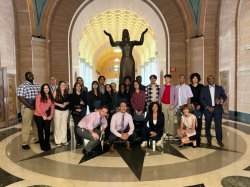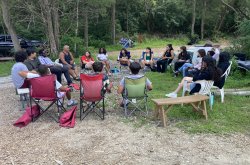High School Students Explore Environmental Law and Native American and Indigenous Peoples’ Rights
Pre-Law Summer Academy offers new opportunities
Posted in: Homepage News and Events, Native American and indigenous Studies, Pre-Law News

This summer, the Pre-Law Summer Academy for high school students introduced students to the legal experience and trial process with a special focus on environmental law and Native American and Indigenous peoples’ rights. A grant from the Law School Admission Council and generous gifts from the Montclair Attorney Alumni Network helped to make the program affordable and accessible to New Jersey students thinking about a career in law.
Isabelle Ramos, the Pre-Law program director, hopes that through this program students will see the legal profession as a place that they can belong and picture themselves in. “This program challenges students to think about their values as a professional as well as what client or communities they want to represent as an attorney,” Ramos says.
The program strives to focus on real-world issues. Ramos emphasizes “the importance of including the rights of Native American and Indigenous peoples in our program was foundational to understanding why and how land in the U.S. may be transferred between tribal nations and private individuals.” Additionally, Indigenous people have been disproportionately affected by land contamination issues. “Many of the students told us this was the first time they have learned about land appropriation and about Native American communities in NJ that are surviving and protecting their culture.”
Mark Clatterbuck, associate professor of Religion and co-director of Montclair’s Native American and Indigenous Studies program, notes the valuable opportunity this program provides for students. Although any career path allows students to support Native communities, Clatterbuck specifically highlights that “one of the most urgent needs for Indigenous communities today is legal advocacy on behalf of environmental justice and defense of tribal sovereignty. If even a couple of this year’s students leave the program with a passion for this work, I’d say it was a huge success.”
In addition to classroom work, students made trips to visit Rutgers and Pace University Law Schools to get first-hand experience with what a law class is like and hear from admission officers about how to prepare for the law school admission process. “This allows the participants to connect their experience in the program with what could be their future,” Ramos says. Students also visited the U.S. Court of Appeals for the Third Circuit, District of New Jersey, and met with the pretrial services department, a U.S. Marshal, U.S. attorneys, The Honorable Judge Patty Schwartz and her two law clerks.

While visiting the Munsee Three Sisters Medicinal Farm in Newton, NJ, students heard from Chief Vincent Mann of the Turtle Clan Ramapough Lenape Nation, about their experiences with environmental racism, specifically the allowance by NJ policymakers at the time to allow Ford Motor Company to dump toxic industrial waste in nearby Ringwood, making the tribe’s ancestral homeland a deadly — and still active — federal Superfund Site. The results of this contamination include negative health impacts, toxic land and poisoned water. While this is a tragedy, Clatterbuck notes the importance of how students “can take steps to challenge these patterns of exploitation by imagining a different application of the law & daring to radically change these rigged systems to create a more just future for all of us.”
The students did take steps to challenge the patterns, as they collaborated to write a letter to NJ legislators informing them of the environmental contamination and the death toll it has had on the Ramapough Lenape Nation as well as proposing solutions for how NJ can move forward. The letter will be emailed to legislators this week.
Written by Faith Monesteri, Fulcomer Intern
